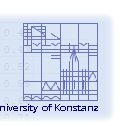






|
Measurement of Policy Positions using Unfolding Item Response Models Project Description
Political scientists basically use two different classes of spatial models. The first class – the older one – is based on Euclidean spaces and follows a distance logic. The second, more recent class of models presumes that directions are more relevant and is based on vector spaces. To empirically test both groups of spatial models, it is essential which methods are utilized to measure political actors’ positions. Conventionally, researchers utilized measurement models like factor analysis, multi-dimensional scaling. Recently, another class of measurement model has increasingly been utilized: item response theory (IRT). It is, however, not widely known that the positions of political actors identified using the conventional IRT can only be interpreted in a directional logic. This project aims to introduce and systematically compare another class of IRT which enables to identify actors’ positions in Euclidian spaces and extend it in Bayesian setting. The extension brings further attractive by-product: missing data problem. Since in Bayesian setting, missing variables can easily treated as unknown parameters, this serious problem in political science can also be approached. Principal Investigator: Prof. Dr. Susumu Shikano
|